The Word Snoop (16 page)
Authors: Ursula Dubosarsky

Doublespeak
1.
A piece of round red or green tree fruit that is commonly used in pies served with ice cream if ingested once every twenty-four hours will ensure that the medical practitioner remains at a distance.
A piece of round red or green tree fruit that is commonly used in pies served with ice cream if ingested once every twenty-four hours will ensure that the medical practitioner remains at a distance.
2.
Refrain from enumerating the offspring of your hens prior to their exit from the eggshell.
Refrain from enumerating the offspring of your hens prior to their exit from the eggshell.
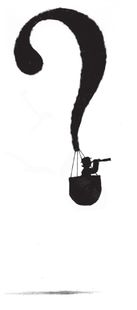
I was
scared to death
. I knew my turn was coming. I sat pretending to be
cool as a cucumber
while I waited for the bell to ring. It
seemed to take forever
and I
lost track of time
. Then the
next thing I knew
it was lunchtime.
Saved by the bell!
I ran outside,
free as a bird
,
without a care in the world . . .
scared to death
. I knew my turn was coming. I sat pretending to be
cool as a cucumber
while I waited for the bell to ring. It
seemed to take forever
and I
lost track of time
. Then the
next thing I knew
it was lunchtime.
Saved by the bell!
I ran outside,
free as a bird
,
without a care in the world . . .
Can you guess why the Word Snoop has put some of the words in the little story above in bold? Well, it’s because each of those expressions is something called a cliché (pronounced
cleeshay
). Clichés are phrases that you have heard and read so many times, they don’t really carry much meaning or excitement anymore.
cleeshay
). Clichés are phrases that you have heard and read so many times, they don’t really carry much meaning or excitement anymore.
The word
cliché
goes back to France in the eighteenth century, when printing was done by making metal plates with the letters placed on them. A particular kind of fixed metal plate, called a
stereotype,
was invented as a quick, cheap way to print something over and over again, instead of making up a new plate each time.
Cliché
(meaning “clicked”) was a word for the sound the plate made in the press, and was often used for the name of the plate itself.
cliché
goes back to France in the eighteenth century, when printing was done by making metal plates with the letters placed on them. A particular kind of fixed metal plate, called a
stereotype,
was invented as a quick, cheap way to print something over and over again, instead of making up a new plate each time.
Cliché
(meaning “clicked”) was a word for the sound the plate made in the press, and was often used for the name of the plate itself.
But although it was a cheaper and quicker method of printing, the print quality of these clichés and stereotypes was not as good as setting up new printing blocks each time. So the words came to be used for characters or expressions in writing that are weak copies, rather than being fresh and original.
Clichés are everywhere—in newspapers, books, television, radio, and songs. Why do we use so many? Well, I suppose the whole reason a cliché comes about is because the first time the expression is used, it seems to describe something really well—that’s why it gets repeated so often and becomes a cliché. When people are in the grip of their deepest emotions, they often use clichés to sum up how they’re feeling: “I’m totally shattered” or “This is too good to be true.”
If you look at the Bible or plays by William Shakespeare, they seem to be full of clichés, with phrases like “by the skin of your teeth” or “there’s method in his madness.” But these weren’t clichés to begin with. They were expressions that people liked, and so kept on saying. The problem is, once you say something too many times, it can lose the meaning it had in the first place.
There are writers, though, who use clichés on purpose. The nineteenth-century French novelist Gustave Flaubert made characters think or speak in clichés because he wanted to show the reader that’s how some people actually think and speak. Other writers play around with clichés and create something called an
anti-cliché.
The Big Bad Wolf is a bit of a cliché—okay, so why not write a story about the Big Good Wolf? That’s an anti-cliché. But then if everyone does it, the Big Good Wolf becomes a cliché too. Then what do you do? (An anti-anti-cliché?)
anti-cliché.
The Big Bad Wolf is a bit of a cliché—okay, so why not write a story about the Big Good Wolf? That’s an anti-cliché. But then if everyone does it, the Big Good Wolf becomes a cliché too. Then what do you do? (An anti-anti-cliché?)
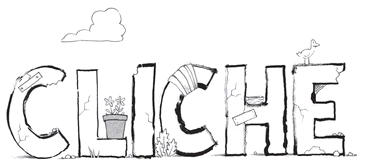
It’s very difficult to avoid clichés completely. The problem with clichés is that they’re
so
familiar that you don’t even notice you’re using them. You can get computer programs now that will look for clichés in your writing and highlight them. What you see might
shock you to the bone!
Oops . . . um . . . I mean,
shock your socks off
. . . I mean,
shock you out of your mind.
Oh dear. How about
may cause disturbance to some viewers
. . . ? Gee, this is harder than it looks!
so
familiar that you don’t even notice you’re using them. You can get computer programs now that will look for clichés in your writing and highlight them. What you see might
shock you to the bone!
Oops . . . um . . . I mean,
shock your socks off
. . . I mean,
shock you out of your mind.
Oh dear. How about
may cause disturbance to some viewers
. . . ? Gee, this is harder than it looks!
Take a look at the little story on page 180 and see if you can rewrite it without the clichés. Which version is more enjoyable to read? And to write?
TautologyWatch out for the
frozen ice
!
frozen ice
!
You may not know it, but this sentence is something called a tautology. It comes from two Greek words—
tautos,
which means “same,” and
logos,
which means “word.”
tautos,
which means “same,” and
logos,
which means “word.”
A tautology is when you repeat something in a sentence when you don’t have to, because the information is already there.
In that first sentence, ice is always frozen (otherwise it wouldn’t be ice), so there is no need to describe it as frozen. You can just say: “Watch out for the ice!” In the same way, if you say that someone is a
famous celebrity,
it’s a tautology because a celebrity has to be famous, otherwise they’re not a celebrity. (Well, that’s the idea, anyway . . .)
famous celebrity,
it’s a tautology because a celebrity has to be famous, otherwise they’re not a celebrity. (Well, that’s the idea, anyway . . .)
Tautologies are far more often said out loud than written down. Your brain takes a bit more time when it’s writing, and usually you realize the problem and fix it up. But when you’re talking, words come out very rapidly, before you can think too much. People who have to speak a lot in public, like sports commentators and politicians, come up with the most tautologies. Like the ones on the next page.
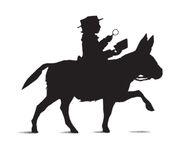
“If we don’t succeed, then we will fail.” (Aha!)
“He’s on the final lap, which is the last one.”
(Good to know.)
(Good to know.)
“The plan was to rob the banks illegally.”
(The things people do . . .)
(The things people do . . .)
“The person who wrote this book must be some
kind of author.” (Some kind of what?)
kind of author.” (Some kind of what?)
The Australian playwright Alexander Buzo collected these sorts of funny tautologies and published whole books of them. Tautologies like this are sometimes known as “Yogiisms,” after the baseball player and sports commentator Yogi Berra. He’s the one credited with the phrase “It ain’t
over
till it’s
over
.” (Yeah, but, like, when is it over?)
over
till it’s
over
.” (Yeah, but, like, when is it over?)
There are some expressions or names we use that are actually tautologies but we don’t realize it. This happens particularly if other languages are involved. The name of the country East Timor, for example, means “East East” because
timur
in Indonesian means “east.” In the supermarket you might see Chai Tea for sale—in Hindi
chai
already means “tea.” (Would you like a nice cup of tea tea?) The same thing can happen with acronyms, when words are shortened to their initials and we forget what the initials stood for in the first place. ATM machine is a tautology, because ATM stands for “Automatic Teller Machine.” (Automatic Teller Machine machine?) And why is PIN number a tautology?
timur
in Indonesian means “east.” In the supermarket you might see Chai Tea for sale—in Hindi
chai
already means “tea.” (Would you like a nice cup of tea tea?) The same thing can happen with acronyms, when words are shortened to their initials and we forget what the initials stood for in the first place. ATM machine is a tautology, because ATM stands for “Automatic Teller Machine.” (Automatic Teller Machine machine?) And why is PIN number a tautology?
As far back as the sixteenth century, grammar books have said that tautologies are a kind of mistake. But actually, they’re not always mistakes—sometimes writers may be using them deliberately on purpose (ha!), to make you pay more attention, or make you laugh or think. William Shakespeare, who many people think was the greatest writer the world has ever known, wrote this famous tautology in his play
Julius Caesar
—“this was the
most unkindest
cut
of all
.”
Julius Caesar
—“this was the
most unkindest
cut
of all
.”
You’ll see plenty of deliberate tautologies in advertising, where they want to make sure you really get the message. Here are just a few the Word Snoop has spotted on her travels:
Free gift
Open every day, including Sunday
Bargain Basement Downstairs
Open every day, including Sunday
Bargain Basement Downstairs
(Gosh, thanks for telling me, I might have headed upstairs . . .)
On the next page is a telephone conversation between two friends that contains quite a few tautologies. I wonder if you can spot them . . .
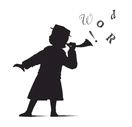
“Have you heard? The Word Snoop has
written her own autobiography.”
written her own autobiography.”
“Is that really true? What an unexpected
surprise!”
surprise!”
“Oh well, I suppose she’s just following her
natural instinct.”
natural instinct.”
“Can you repeat that again? I didn’t hear
the inaudible part.”
the inaudible part.”
“Sorry, must go. Look at the time! It’s
already five p.m. in the afternoon.”
already five p.m. in the afternoon.”
“Okay, bye. See you when I see you!”
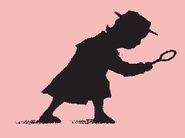
How is it going, Word Snoops? Ready to tackle another code? (Hint: It will help to know what an acronym is.)
Lazy Insects Carefully
Eat Nutty Sausages
Every Day
Eat Nutty Sausages
Every Day
Answers
DOUBLESPEAK
1.
An apple a day keeps the doctor away.
An apple a day keeps the doctor away.
2.
Don’t count your chickens before they hatch.
Don’t count your chickens before they hatch.
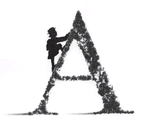
Other books
Cerebros Electronicos by George H. White
The Lost Swimmer by Ann Turner
Blackwater by Tara Brown
Black Arts: A Jane Yellowrock Novel by Hunter, Faith
Are You My Mother? by Voss, Louise
The Prom Queen by R.L. Stine
Avenger by Frederick Forsyth
Revolution 19 by Gregg Rosenblum
Seeking Nirvana by V. L. Brock
